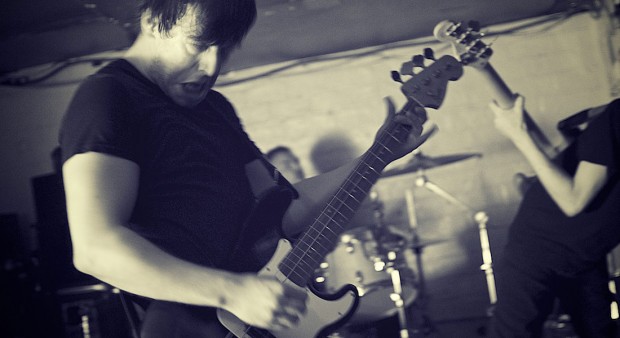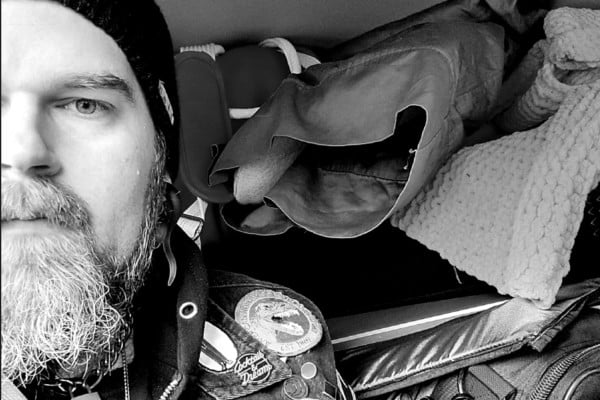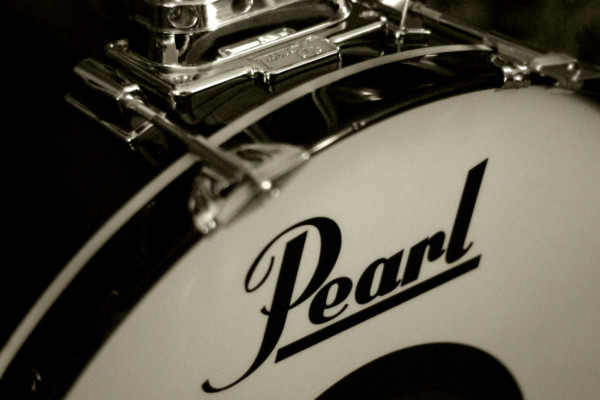Self Expression: Thoughts and Discussion for Bass Players

Q: Most pros say that playing with other musicians is one of the most important things a bassist can do. After practicing alone for a few years, I’ve returned to the band setting. I love gigging and I love band practice, but I find myself playing very conservatively. In no way am I trying to get crazy and show off double thumbing or 4-finger techniques, but I find myself afraid to step outside the box and try even as much as an appropriately place fill. However, one cool result of playing so conservatively is that I’ve learned how much existence of the pocket depends on the bass and dynamic choices are as vital as note choices. My fear isn’t so much with stepping outside the box… it’s with stepping into self expression. So I’m wondering is if you could share your journey of discovering your voice and what you have to say with it.
A: Well, first I’d like to commend you for your self-restraint. I had to be beaten into understanding how much more effective a solid pocket bass line was as opposed to my flurry of arpeggiated, upper-structured, flying-fingers-of-doom licks at the drop of a dime (you wouldn’t believe the junk I could cram into something as pure as a Beatle’s tune, for example).
More specifically, I learned to play fast before I learned how to play bass. Thankfully, the right combination of things happened for me to get over it:
- Coaching
- Constructive criticism by musicians I admired
- Listening back to recorded works objectively (appalled at myself most of the time)
- Getting approving looks from bandmates when I would lock it down without flair
It finally dawned on me that while I may be technically playing this instrument at a high level, I was actually making music poorly. What’s interesting to me is that I never even really liked overly indulgent music that much. None of the music I listened to ever had anything to do with how I played the bass when I got it in my hands. I was just having my own little party in my own little world for (far too many) years.
Thus began my process of reduction.
My current method is simply this: if I hear it in my head and is sounds good to me, I will play it. If I feel like I should do something fancy, then I won’t play it. Never play a lick because you think you should or because you think somebody wants to hear it. Play it because you hear it in the song, in that spot and in that moment.
There are genre-specific exceptions to the rule, of course. Fusion almost requires us to let it all hang out (although, I don’t think it needs to. It’s just whats expected).
Try to put yourself in position to have the same sort of feedback I’ve listed above – coaching, peer review and reaction, and listening to yourself.
And avoid feeling like you have to succumb to the peer pressure. Sometimes I feel like Youtube bass videos are like drug pushers, telling kids to play more, more, faster, FASTER! Nobody actually wants that outside of other bass players (though not all of them), or shred bands.
I say, bask in the glory of your gigantic pocket! (I know that your bandleaders likely do!)
Readers, how about you? What’s your approach to self expression on the bass? Please share in the comments.
Have a question for Damian Erskine? Send it to [email protected]. Check out Damian’s instructional books, Right Hand Drive and The Improviser’s Path.




Similar experience of retreating from the band environment for a year or 2, its amazing how your approach matures when its just your hands, bass and ears. Being my own worst critic, I soon weed out those bad ideas that I would have normally played.
Sometimes its good to step back.
Throughout this process I’ve gained an appreciation for how much impact the bass can have by simply playing straight eights. By nature, I want to be playing something for every part of a song…but I can’t argue with how much can be accomplished by dropping out for a verse then coming in on the refrain. Its given me an appreciation for bassists like Tommy Shannon & Jason Newsted.
Just look at Stu Hamm…we all know how much and how fast he can play…but his ability to sit in the pocket and serve the is what lands him the gigs like G3.
As extreme as this may read, I once took a 14-years absence…it was mind-blowing to come back after thinking I would never play a gain. My mind changed, my music changed and my life changed. – Thanks, Damian!
Great Answer Damian. The ability to play the song and support the pocket is what has most been lost with bassists these days.
So here’s my take on this because I do plenty of sideman work and I also do my own music which is wider in terms of the parameters of what I can/can’t do.
Bass, in terms of its function in music, is an instrument that is about support. But if one were to just stop there, they’d be a lousy bass player because they will have missed many of the things that constitute what is considered “appropriate” ways to support the music. There are levels and dynamics to what “support” means. If you play in any setting and you are not interacting with the other musicians, you are not really doing anything to enhance the music. It requires active energy. Even if that energy utilizes repetition of notes as the constant.
Being creative and self-expressive has nothing to do with how much or how little you play. It has everything to do with being free within the confines of what you are doing and the music you are playing. (Read that sentence again. I’ll wait.)
But with that comes the responsibility of owning the musical decisions that you make. Sometimes when making complicated music, your role as a bassist might not have to be complicated. Bass needs to know this better than other instrumentalists at times. There is honor and power in that, though. And the right people will respect you for that.
So here are some tips to consider while playing: 1) If you are thinking about it too much, you probably shouldn’t be doing it. 2) If you aren’t sure, you probably shouldn’t be doing it. 3) If you feel like you really “snuck it in there” while quoting 1/2 of Jaco’s solo from “Port of Entry” within 2 bars while doing a fill–a) Why? b) You probably shouldn’t be doing that if you feel like you’re “getting one over” on the music. Ultimately, this is the difference between a seasoned musician and a less developed musician.
The best thing that happened to my bass playing was writing and producing music. Once I started doing that, I learned how to edit my ideas better and pick and choose my spots with more wisdom and taste. I would advise anyone struggling to reconcile the creative/expressive part of playing with the functional part of playing to try composing/writing some music.
Lastly, there’s another side to that, and that’s trying something new or different. If you make the rules in the musical setting that you are in, then you can play/write bass parts which are unconventional. There is a track on my latest record called “Sphere”. The video was featured on this site about a month ago (thanks No Treble!) and I got a ton of views the week it came out and then some. It also got trolled by some folks. (Even on here) Who cares though? It didn’t matter. People watched. Sales of my album spiked. And my audience grew. Awesome.
When you are trying all this stuff on your path. Have no fear.
It’s only music.
”Play simple, you will get jobs” : Alain Rinallo, my teacher. This sentence is on my mind since I started the bass guitar. It is actually true.
Most of the people looking for a bass player would like someone that locks with the drummer, can play simple, have good ryhtms and creativity to give this ‘little more thing’ to theirs songs.
However, it is important to let the other musician want to play with you for what you do, your own voice when it is time to play the bass. It is a clever mixture between working alone, practicing your skills and improve your playing your way and learning from others. This is nothing better than playing with other than learning all your life with a teacher. The meeting and the feedback you gonne be given by other are the things that are going to make you feel more confortable when it comes the time to play bass.
Always stay yourself and confident in what your playing is.
These are the things that help me on a daily basis.
“A self-respecting artist must not fold his hands on the pretext that he is not in the mood.” ~ Pyotr Ilyich Tchaikovsky
“But, a self-respecting artist must not force his or her hands on the pretext that he is not in the inspirational mood to create his or her best works.” ~ Ernie Leblanc
As extreme as this may read, I once took a 14-years absence…it was mind-blowing to come back after thinking I would never play a gain. My mind changed, my music changed and my life changed. – Thanks, Damian!
Beautiful, Damian. And encouraging. I sometimes mourn the chops I let go as I dove deep into the pocket. But *all* of those voices, coaching, peers and audience reactions, pointed me toward thinking in those supportive purposes. Great stuff!
FunnY how expression seems to always be about “fast killer chops”. Exression to me is a lot more about note length and tone. You can express yourself so much through this. I guess this isn’t attention grabbing enough though. However, don’t confuse expression with chops. To me, they are different things.
I’m reminded of a drummer who would play double-bass in the chorus section of a cover song we did. After a gazillion times of politely telling him that it might not be working, I LAUNCHED into him and said that he was completely burying the vocals, which was a BAD thing, since the song was COMPLETELY vocal oriented. He whined about wanting to ‘express’ himself, and I told him that the most important thing was what the SONG REQUIRED – not his feelings. It’s all about KEEPING ONE’S EGO IN CHECK. Playing what the MUSIC REQUIRES, and knowing what that is, is the mark of a professional. Whining about ‘self-expression’ is an amateur move.
Play other genres. Learn about MUSIC. Explore chord theory. Slow things down when you practice. By default, you will become a more diverse player.
“I’m no Jaco” That’s quite often my opener when coming into a new band or session situation . I don’t have flying fingers but I seem to have a great knack for reading the drummer, laying down a solid groove and coming up with the nice fill here and there. I get asked back often, other bass players (often my betters) recommend me to sub for them when double booked, sick or on the road. Self expression is not how many notes you can cram into two or four bars. It is in feeling the music and being able to express that feeling. Proficiency facilitates expression, but without feeling, technique is only dry mechanical ability. If you’re in the middle of a piece and feel inspired to do something that you’re not sure you can pull off, go home and work on it, play with it, you will have it in your arsenal to use the next time. Go out to jam sessions…trying things out in a jam situation is an excellent way to find out what works and what you need to work on to better be able express yourself.
I guess what I’m trying to say is do the best with what you’ve got, put yourself into playing situations where you can push the envelope without courting musical disaster….take chances those when you can, it’s part of the fun and really cool when you surprise yourself with what you can actually do.
I got flack from band mates back in high school for playing “lead bass”. Instead of taking it as constructive criticism I sort of rebelled and kept poking the bear. They put up with me because I added a certain panache, was melodic and still held down the bottom end, but looking back at it, I was immature and annoying.
Decades later I found myself playing stand up bass in a traditional country unit. I really learned the beauty of limitations from an instrument that pulled back on the reins a little. The pocket is a really sweet place to live, and less can be way, way more.
I mostly play six string guitar these days, and I like playing melody when it comes my turn to do so, but I enjoy playing rhythm every bit as much, probably more.
Right on man…ALWAYS play for the song…not your personal tastes